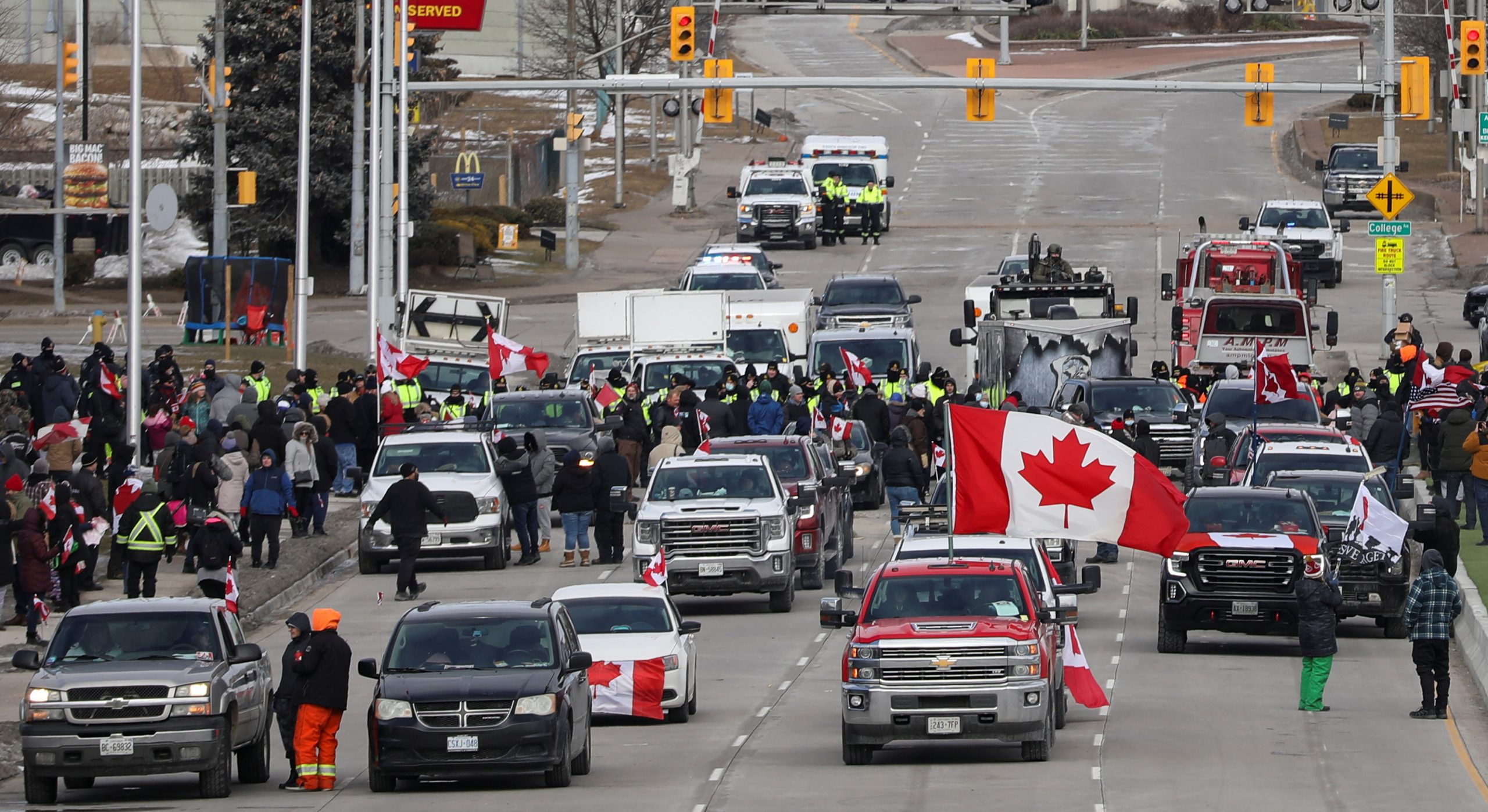
Willie R. Tubbs, FISM News
[elfsight_social_share_buttons id=”1″]
Saturday, Canadian police began their efforts to disband several pockets of protestors who have strategically located themselves in that nation’s capital as well as at several border entries from the United States.
In recent days, Freedom Convoy protestors have faced the seizure of their fuel (both diesel and firewood), a judge’s order demanding an end to a border blockade, and accusations of white supremacy by the nation’s highest ranking official.
To date, no effort from law enforcement or Canadian officials has lessened the protestors’ resolve or shrunk the protest, and Saturday proved no different.
As first reported by the Associated Press, members of the Freedom Convoy complied Saturday when asked by police to remove vehicles that had been blocking the bridge that connects Windsor, Ontario, to Detroit.
Shortly after the original protestors vacated the area, even more protestors convened near the bridge and again prevented traffic from entering or leaving Canada.
“WPS along with policing partners continue to engage with demonstrators for the purpose of enforcement,” the Windsor Police tweeted Saturday morning. “No arrests at this time. We appreciate the cooperation of the demonstrators at this time, and we will continue to focus on resolving the demonstration peacefully. Avoid area!”
WPS along with policing partners continue to engage with demonstrators for the purpose of enforcement. No arrests at this time. We appreciate the cooperation of the demonstrators at this time and we will continue to focus on resolving the demonstration peacefully. Avoid area!
— Windsor Police (@WindsorPolice) February 12, 2022
If law enforcement seems to be moving carefully, it is likely because police forces are not yet staffed with enough manpower. Police in Ottawa have stated they are awaiting “reinforcements” before intensifying their efforts.
Although almost certain to cast Canadian authorities in the worst possible light – few would enjoy seeing police forcibly removing working-class people who have thus far been a loud, but peaceful, nuisance – more forceful government intervention might be unavoidable.
Canadian Prime Minister Justin Trudeau, who long ago garnered heavy criticism from truckers and farmers for his endorsement of vaccine mandates and passports, has now begun facing pressure from ruling-class figures from around the world who feel he’s been too slow and not forceful enough in his dealings with the protestors.
“I convened the Incident Response Group again today – we went over the efforts underway to address the illegal blockades and occupations,” Trudeau tweeted late Saturday night. “We’ll continue to make sure municipal, provincial, and federal authorities have what they need to end the blockades and protect public safety.”
I convened the Incident Response Group again today – we went over the efforts underway to address the illegal blockades and occupations. We’ll continue to make sure municipal, provincial, and federal authorities have what they need to end the blockades and protect public safety.
— Justin Trudeau (@JustinTrudeau) February 13, 2022
The protestors have said they will not leave without major national concessions on mandates and vaccine tracking as well as Trudeau’s removal from office.
Even though some provinces have begun to relax mandates, it is unlikely such a concession will be made at the federal level. Trudeau is also no doubt resolute about remaining in office.
As evidenced by Saturday’s developments, the Freedom Convoy has shown no signs of wavering in the face of police pressure. There might not be a method by which this protest can end without a more severe government response, which historically has played poorly in the public eye for the aggressor.
Friday, Trudeau spoke by phone with U.S. President Joe Biden, who has sided fully with the Canadian prime minister.
“[Biden and Trudeau] agreed that the actions of the individuals who are obstructing travel and commerce between our two countries are having significant direct impacts on citizens’ lives and livelihoods,” a White House statement reads. “The President expressed his concern that U.S. companies and workers are experiencing serious effects, including slowdowns in production, shortened work hours, and plant closures. The Prime Minister promised quick action in enforcing the law, and the President thanked him for the steps he and other Canadian authorities are taking to restore the open passage of bridges to the United States.”
Saturday night, Trudeau indicated the government and police’s response would increase in the coming days.
In a statement, Trudeau and his response group “emphasized the urgent need for anyone participating in the blockades to return to their communities peacefully and immediately, and that consequences for breaking the law will be increasingly severe … These blockades must be brought to an end, and the federal government will continue working on every option to end them.”
The truckers’ protest has grown to include numerous cities in Canada and inspired similar action in France, the Netherlands, and New Zealand.
